仁爱英语七年级下册Unit7 Topic3 知识点总结+练习
仁爱英语七下Unit7-topic3重要知识点和语法点归纳

Unit 7-The Birthday PartyTopic3 Everyone had a good time。
一、重点短语1. take a walk 散步2.had better 最好3.go out 外出ter on 然后e back to life 复苏6. be busy doing 忙于做某事7.in spring 在春天8.go swimming 游泳9.make a snowman 做雪人10. summer holiday 暑假11. plan to do 计划做某事儿12.go for a walk 出去散步13. be different from 与。
不同st from….to…. 从。
时候持续到st for … 持续多久16.get warm 变暖和17.weather report 天气预报18.learn to do sth 学习做某事儿19..all day 整天二、重点句型1.It’s your turn. 该你了。
turn 是名词,意思是“轮流”轮到某人做某事了。
turn还可以做连系动词,意为“变成……”,后接形容词做表语。
2.We did see a movie. 我们的确看电影了。
(do/did/does +动原表强调)I do think he is right.3. Did Kangkang enjoy himself? 康康玩得开心吗?Enjoy是及物动词,后接名词,代词或是动名词,意为“喜爱,欣赏,享受……的乐趣。
”巧辩异同l i k e,l o v e与e n j o y(1)like喜欢(程度较弱)like doing/to do(2)love热爱(程度较强)love doing/to do(3)enjoy喜爱,欣赏,享受……的乐趣enjoy doing4 . 反身代词oneself变化如下:①第一二人称用形容词性物主代词+self(selves) I→myself you→yourself(yourselves)②第三人称用人称代词宾格+self(selves) he→himself they→themselves5. What happened to Michael at the party? 聚会上迈克发生什么事情了?to是介词to是不定式符号5. I went to the movies with Alice. 在美式英语中,去看电影常用go to the movies在英式英语中,常用go to the cinema 或see a film7. We went to Alice’s home and talked about it until 12o’clock.until在此是介词,后面常接表示某一时间点的名词,它还可以用做连词,后接从句。
仁爱版英语七年级下册Unit7 Topic3 知识点总结

Unit 7 The Birthday PartyTopic 3 Everyone had a good time.Section A 重点词组句子1.唱一首英文歌 sing an English song 唱一首中文歌 sing a Chinese song2.表演魔术 perform magic tricks3.弹钢琴play the piano4.玩得愉快(enjoy) enjoy oneself=have fun=have a good time5.跳迪斯科 dance to disco6.在生日聚会上 at the birthday party7.弹吉他play the guitar 8.表演中国功夫perform Chinese kung fu1.---康康的生日聚会怎么样?---非常好。
---How was Kangkang’s birthday party? --- It was very nice.2. ---你在晚会上唱歌了吗? ---是的。
--- Did you sing a song at the party ? ---Yes, I did.3. 你唱了一支中文歌还是一支英文歌?Did you sing a Chinese song or an English song?4.他表演了一些魔术。
He performed some magic tricks.5.---康康玩得高兴吗? ---当然了。
他很开心。
---Did Kangkang enjoy himself? --- Of course. He was very happy.6.康康表演了中国功夫。
Kangkang performed Chinese kung fu.Section B 重点词组句子1.做游戏 play a game/ play games2.摔倒,滑到 fall down3.伤了某人自己 hurt oneself4.洗手wash one’s hands5.立刻,马上 at once6.害怕,恐怕 be afraid +that从句 be afraid to do sth.害怕做某事 be afraid of +名词害怕某物7.忘了时间 forget the time 忘记去做某事forget to do sth. 忘记做过某事forget doing sth.8.早点回来 come back early9.下次next time 10.告诉某人去做某事tell sb. to do sth.告诉某人某事 tell sb. sth 告诉某人关于某事tell sb. sth. about sth. 11.昨晚last night1.---怎么啦? ---我没坐到椅子上,摔倒了。
仁爱版七年级英语下册Unit7Topic3知识点归纳【DOC范文整理】

仁爱版七年级英语下册Unit7Topic3知识点归纳Topic3重点语法行为动词的一般过去时及其回答。
重点句型—Didyousingasongattheparty?—yes,Idid/No,Ididn’t.Iissedthechairandfelldon.Hocouldyoulietoe?angangadeasilentishandtheheblethecandlesoutinonebre ath.重点讲解Didangangenjoyhiself?康康玩得开心吗?Enjoy是及物动词,后接名词,代词或是动名词,意为“喜爱,欣赏,享受……的乐趣。
”enjoyoneself=haveagood/greattie玩得愉快enjoydoningsth.喜欢做某事巧辩异同lie,love与enjolie喜欢liedoing/todolove热爱lovedoing/todoenjoy喜爱,欣赏,享受……的乐趣enjoydoingIt’syourturn.该你了。
turn是名词,意思是“轮流”,It’sone’sturntodosth.轮到某人做某事。
还可以做连系动词,意为“变成……”,后接形容词做表语。
反身代词oneself变化如下:二人称用形容词性物主代词+selfI→yselfyou→yourself第三人称用人称代词宾格+selfhe→hiselfthey→theselveshathappenedtoichaelattheparty?聚会上迈克发生什么事情了?happentosb.某人发生某事,to是介词happentodo…碰巧干某事,to是不定式符号语法讲解一般过去式一、一般过去式表示:过去存在的状态。
yfatheratatoryesterdayafternoon.过去某个时间发生的动作。
Igotupat6:30yesterday.过去经常或反复发生的动作。
Healaysenttoorbybuslastyear.常用的时间状语:todays/onths/yearsago,lastyear,inthosedays,justno,i nXX等。
仁爱版英语七年级下册Unit7Topic3 知识点归纳
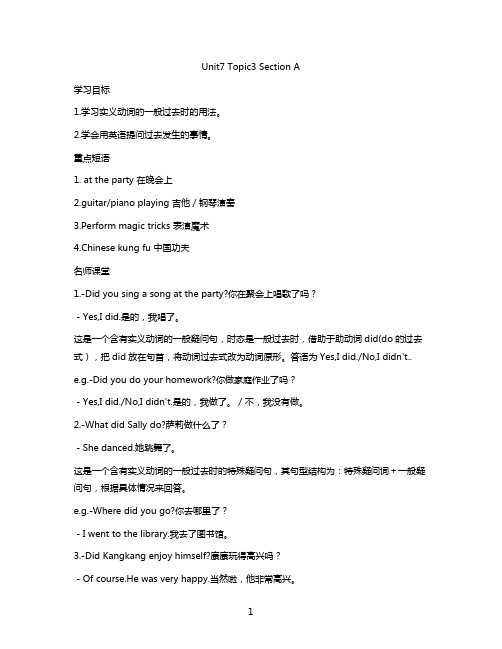
Unit7 Topic3 Section A学习目标1.学习实义动词的一般过去时的用法。
2.学会用英语提问过去发生的事情。
重点短语1. at the party 在晚会上2.guitar/piano playing 吉他/钢琴演奏3.Perform magic tricks 表演魔术4.Chinese kung fu 中国功夫名师课堂1.-Did you sing a song at the party?你在聚会上唱歌了吗?-Yes,I did.是的,我唱了。
这是一个含有实义动词的一般疑问句,时态是一般过去时,借助于助动词did(do的过去式),把did放在句首,将动词过去式改为动词原形。
答语为Yes,I did./No,I didn't..e.g.-Did you do your homework?你做家庭作业了吗?-Yes,I did./No,I didn't.是的,我做了。
/不,我没有做。
2.-What did Sally do?萨莉做什么了?-She danced.她跳舞了。
这是一个含有实义动词的一般过去时的特殊疑问句,其句型结构为:特殊疑问词+一般疑问句,根据具体情况来回答。
e.g.-Where did you go?你去哪里了?-I went to the library.我去了图书馆。
3.-Did Kangkang enjoy himself?康康玩得高兴吗?-Of course.He was very happy.当然啦,他非常高兴。
(1)enjoy doing sth.喜欢做某事,享受做某事的乐趣。
(2)enjoy oneself=have a good time 过得愉快,玩得高兴。
oneself 为反身代词。
Unit7 Topic3 Section B学习目标1.继续学习实义动词的一般过去时。
2.掌握有关责备的句子,鼓励学生做一名诚实的孩子。
重点短语1.fall down 摔倒2.hurt oneself 伤着某人自己3.at once 立刻,马上4.This way,please 请往这边走5.have a good/great time 玩得很高兴6、next time 下次名师课堂1.-What's the matter?怎么啦?-I missed the chair and fell down.我没坐到椅子上,摔倒了。
仁爱版初中英语七年级下册Unit7Topic3课文+单词+知识梳理
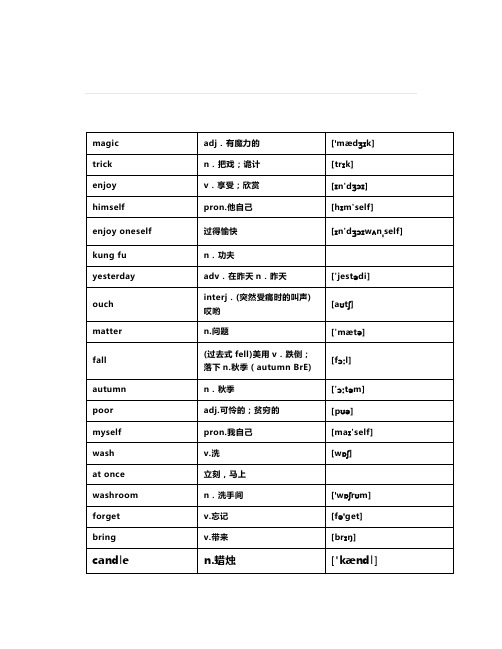
知识梳理:【重点短语】1. recite a poem 背诗2. Perform magic tricks 表演魔术3. Perform kungfu 表演功夫4. It's your turn. 现在轮到你了5. miss the chair 没坐到椅子6. poor Michael 可怜的迈克尔7. Did you hurt yourself? 你摔伤了吗?8. hurt oneself 伤着某人自己9. go and wash them at once 马上去洗一洗10. This way, please. 请走这边。
11. come back 回来12. come back home 回家来13. come back to school 回到学校14. play video games 玩电子游戏15. lie to sb = tell a lie to sb 对某人撒谎16. tell me the truth 跟我说实话17. each of us 我们每个人18. sit around 坐在...周围19. make a silent wish 默默许个心愿20. blow the candles out = blow out the candles 吹灭蜡烛21. in one breath 一口气22. have a big dinner 吃一次大餐【重点句型】1.Did Kangkang enjoy himself?康康玩得开心吗?2.It’s your turn.该你了。
3.What happened to Michael at the party?聚会上迈克发生什么事情了?4.What’s the matter ? 怎么啦?5.This way, please . 请往这边走。
6.We bought many presents for him.我们给他买了许多礼物。
仁爱英语七年级下册Unit7Topic3知识点总结+练习

Every one had a good time.'、教学内容、重点短语at the party 在派对上 perform magic tricks 表演魔术fall dow n 掉下,落下,摔倒,倒塌 hurt on eself 伤了某人自己lots of= a lot of 许多 make sth. by hand 亲手做 blow out 吹灭二、重点句型Did you sing a song at the party? Yes, I did./ No, I didn 'Did you sing a Chin ese song or an En glish song? An En glish song. 3. What ' the matter?4. What time did you come back home last ni ght?二、 ^4言点1 Did Kangkang enjoy himself?康康玩得开心吗?Enjoy 是及物动词,后接名词,代词或是动名词,意为“喜爱,欣赏,享受 ”的乐趣。
”enjoy on eself = have a good/great time 玩得愉快 enjoy doing sth. 喜欢做某事巧辩异同 like, love 与 enjoy (1)like 喜欢(程度较弱)like doing/to do⑵love 热爱(程度较强)love doing/to do(3)enjoy 喜爱,欣赏,享受 ,,的乐趣enjoy doing2.反身代词on eself 变化如下:①第一二人称用形容词性物主代词+self(selves)I T myself you 宀 yourself(yourselves) ②第三人称用人称代词宾格+self(selves) he ^ himself theythemselves四、重点语法---行为动词的一般过去时1. 否定句:didn '+动词原形女口: Jim didn ' t go home yesterday.一般疑问句:在句首加did,句中的动词过去式变回原形。
仁爱版英语七年级下学期unit7topic3复习知识点
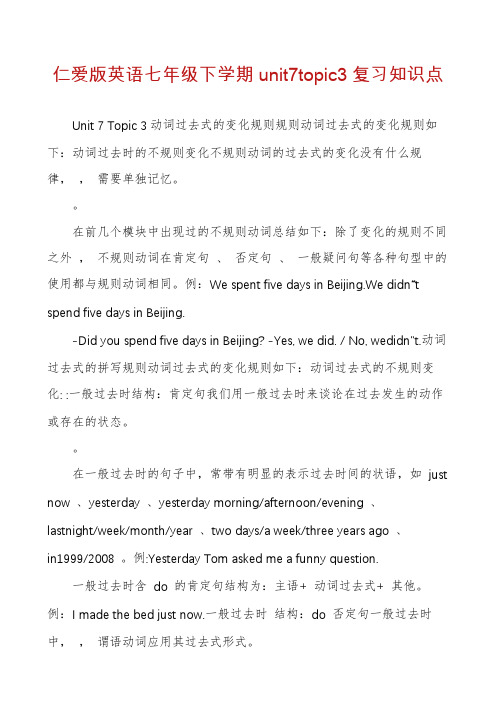
仁爱版英语七年级下学期unit7topic3复习知识点Unit 7 Topic 3动词过去式的变化规则规则动词过去式的变化规则如下:动词过去时的不规则变化不规则动词的过去式的变化没有什么规律,,需要单独记忆。
在前几个模块中出现过的不规则动词总结如下:除了变化的规则不同之外,不规则动词在肯定句、否定句、一般疑问句等各种句型中的使用都与规则动词相同。
例:We spent five days in Beijing.We didn“t spend five days in Beijing.-Did you spend five days in Beijing? -Yes, we did. / No, wedidn"t.动词过去式的拼写规则动词过去式的变化规则如下:动词过去式的不规则变化: :一般过去时结构:肯定句我们用一般过去时来谈论在过去发生的动作或存在的状态。
在一般过去时的句子中,常带有明显的表示过去时间的状语,如just now 、yesterday 、yesterday morning/afternoon/evening 、lastnight/week/month/year 、two days/a week/three years ago 、in1999/2008 。
例:Yesterday Tom asked me a funny question.一般过去时含do 的肯定句结构为:主语+ 动词过去式+ 其他。
例:I made the bed just now.一般过去时结构:do 否定句一般过去时中,,谓语动词应用其过去式形式。
当句中谓语动词为实义动词时,否定句中需借助did not (didn"t) 构成否定,同时将谓语动词变为原形。
结构:“ 主语+did not (didn"t)+ 动词原形+ 其他. ”如:I did not (didn"t) walk to school today.我今天没有走路上学。
七年级英语(仁爱版)下册Unit_7_Topic_3知识点练习

Unit 7 Topic3一、词汇:enjoy oneself = have a good time __________________ at once __________________blow out __________________ sing songs __________________play the piano __________________ dance to disco __________________ perform magic tricks __________________ fall down__________________ perform Chinese Kung fu __________________ hurt oneself__________________last night __________________ next time __________________by hand __________________ sat around__________________make a wish __________________ play games __________________each of us __________________ lots of=a lot of __________________ 二、语法:动词过去式的规律:①一般情况v+ed . 如:play —played, perform —performed②以不发音的e结尾的+d . 如:dance —danced, recite —recited③以辅音字母+y结尾的,变y为i+ed. 如:carry —carried, study —studied, worry —worried④末尾只有一个辅音字母的重读闭音节词, 先双写辅音字母, 再加ed . 如:plan —planned , stop —stopped⑤不规则动词的过去式参见课本P142.⑥(读音)清辅音后读/t/ , 元音、浊辅音后读/d/, /t/ /d/ 后面读/id/is/am are begin do sing fall go forget comehave/has tell make give bring sit blow say get三、句型:1. How was Kangkang’s birthday party? 康康的生日派对怎么样?---It was very nice. 很好。
仁爱版英语七年级下册Unit 7 Topic 3 Section A 知识解析和练习
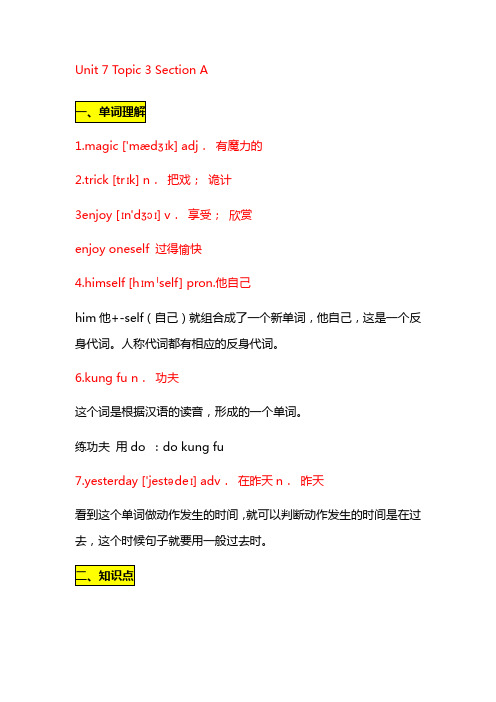
Unit 7 Topic 3 Section A1.magic ['mædʒɪk] adj.有魔力的2.trick [trɪk] n.把戏;诡计3enjoy [ɪn'dʒɔɪ] v.享受;欣赏enjoy oneself 过得愉快4.himself [hɪmˈself] pron.他自己him他+-self(自己)就组合成了一个新单词,他自己,这是一个反身代词。
人称代词都有相应的反身代词。
6.kung fu n.功夫这个词是根据汉语的读音,形成的一个单词。
练功夫用do :do kung fu7.yesterday ['jestədeɪ] adv.在昨天n.昨天看到这个单词做动作发生的时间,就可以判断动作发生的时间是在过去,这个时候句子就要用一般过去时。
1.How was Kangkang's birthday party? 康康的生日聚会怎么样?(1)birthday party 生日聚会(2)How 用于询问怎么样,用于问评价,身体状况,交通方式。
How do you like geography?你认为地理怎么样?(问看法)How are you?你身体好吗?用于问候。
(问候身体状况)How do you usually go to school? 你通常怎样去学校。
(问交通方式)2.It was very nice.非常棒。
这句话用于评价。
It’s very nice of you.你真是太好了。
意思相近的有:It’s very kind/friendly of you.你真友好。
这句话主要用于别人对我们提供了帮助之后,我们进行的一种表示感激的评价。
3.Did you sing a song at the party?你在聚会上唱歌了吗?Yes, I did.是的,我唱了。
(1)这句话是一般过去时的一般疑问句。
肯定句:I sang a song at the party.我在聚会上唱了首歌。
(完整版)仁爱版英语七年级下Unit7topic3知识清单

仁爱版英语七年级下Unit 7 知识清单Topic 3一,重点句型1. Did you hurt yourself?2. What happened to Michael at the party?3. How could you lie to me?4. Why didn’t you tell me the truth?5. I won’t do it again.6. It’s your turn.7. Where is the washroom? —This way, please.8. He performed some magic tricks.9. We made the cards by hand.10. Kangkang made a wish and then blew out the candles.一般过去时的概念一般过去时表示过去某个时间发生的动作或存在的状态。
常和表示过去的时间状语连用。
如:last year, yesterday,three days ago等;也可表示过去经常反复发生的动作,常和often, always等频率副词连用。
(1). 一般过去时结构1). 肯定句: 主语+谓语动词的过去式+其它, 谓语动词不随人称的变化而变化。
Eg:She saw a film last week.2). 否定句:主语+didn’t +动词原形+其它。
Eg:He didn’t have breakfast this morning.3). 一般疑问句: Did + 主语+ 动词原形+其它?简单回答: Yes, 主语+did. / No, 主语+ didn’t.Eg:Did you go to the zoo last Sunday?Yes, I did./ No, I didn’t.4). 特殊疑问句: 疑问词+ 一般疑问句?Eg:What did you do yesterday?(2). 用法1). 表示过去的动作或存在的状态Eg:They had a birthday party last Friday.2). 表示过去经常反复发生的动作Eg:He went home and then sat down.3). 实义动词的一般过去式也可与today, this week / morning 等时间状语连用但动作必须到说话时已经结束。
仁爱版英语七年级下册Unit7_Topic3_教材知识详解

Unit7 Topic3 教材知识详解1. Did Kangkang enjoy himself? 康康玩得高兴吗?enjoy 后接名词、代词或动名词,意为“享受……之乐,欣赏,喜爱”。
如:We enjoyed the concert very much.我们非常喜欢这场音乐会。
Thanks for the great party! I really enjoyed it. 感谢这美好的派对!我玩得很开心。
I enjoy reading. 我喜欢看书。
【注意】enjoy oneself = have a good time = have a wonderful time 过得愉快。
如:The children enjoyed themselves at the park yesterday.=The children had a good/wonderful time at the park yesterday. 孩子们昨天在公园玩得很高兴。
【链接】与enjoy同意的近义词有like, love,—般情况下可以通用,但enjoy只能跟名词、代词或动名词,不能接不定式,而love, like均可。
其区别如下:enjoy喜爱、享受……乐趣(具有满足感)。
如:She enjoys listening to music.她认为听音乐是一大乐趣。
like意为“喜欢”,指不反感,但不引起强烈的感情和迫切的愿望。
如:I like having a walk after supper. 晚饭后我喜欢散步。
Do you like to play chess? 你喜欢下棋吗?love意为“热爱”,指引起深厚的、强烈的感情,并有依附感。
如:I love my mother. 我爱我母亲。
2. 一What’s the matter? 怎么啦?一I missed the chair and fell down. 我没坐到椅子上,摔倒了。
仁爱英语七年级下册unit7知识点
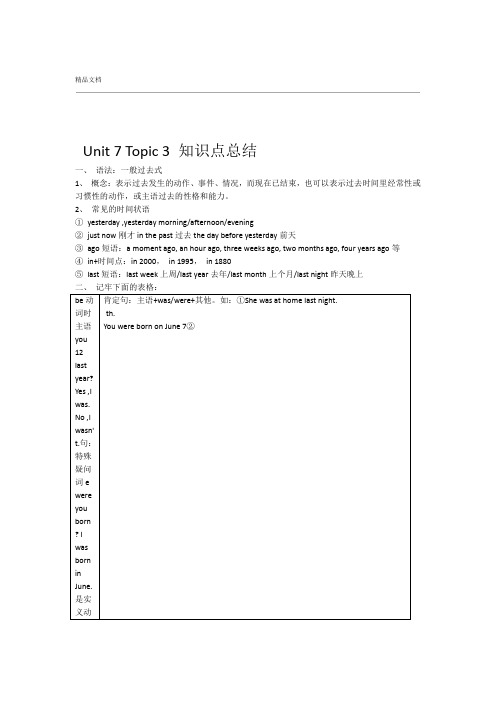
精品文档Unit 7 Topic 3 知识点总结一、语法:一般过去式1、概念:表示过去发生的动作、事件、情况,而现在已结束,也可以表示过去时间里经常性或习惯性的动作,或主语过去的性格和能力。
2、常见的时间状语①yesterday ,yesterday morning/afternoon/evening②just now刚才in the past过去the day before yesterday前天③ago短语:a moment ago, an hour ago, three weeks ago, two months ago, four years ago等④in+时间点:in 2000,in 1995,in 1880⑤last短语:last week上周/last year去年/last month上个月/last night昨天晚上二、记牢下面的表格:是三、重要词组1、at the party在聚会上2、recite a Chinese poem背汉语诗3、perform magic tricks表演魔术4、enjoy oneself=have a good time玩的愉快5、miss the chair 坐空椅子6、fall down摔倒7、hurt yourself伤了你自己8、at once立刻9、sth happened to sb某事发生在某人身上10、at that time在那时11、come back home回家12、lie to sb向某人撒谎13、tell sb the truth告诉某人真相14、go to the party with sb和某人一起去参加party15、last night昨天晚上16、tell a lie to sb向某人说谎17、make sb angry使某人生气18、lose the game输了比赛19、buy lots of food and drinks for sb为某人买许多食物与饮料20、each of us我们每一个人21、make the card by hand亲手制作卡片22、a big birthday cake with 13 candles带13根蜡烛的大生日蛋糕23、make a silent wish默默地许愿.精品文档24、blow the candles out in one breath一口气吹灭蜡烛25、it's your turn 轮到你了26、it's one's turn to do sth轮到某人做某事27、enjoy doing sth=like doing sth喜欢做某事四、重要句型1、How was Kangkang's birthday party? It was very nice.康康的生日party怎么样?它很不错。
仁爱版英语七年级下册Unit7Topic3
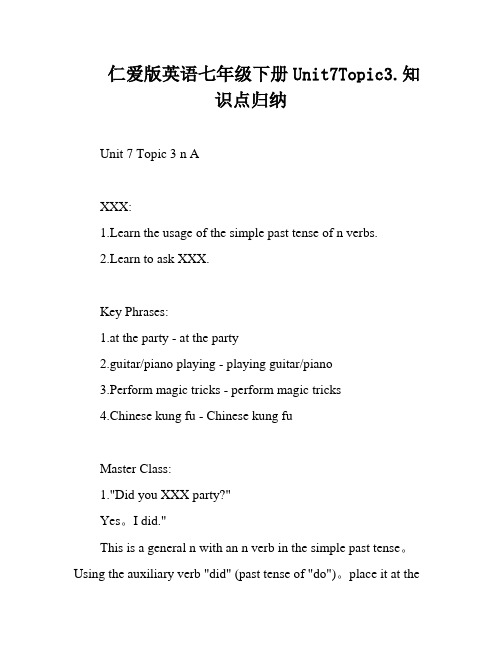
仁爱版英语七年级下册Unit7Topic3.知识点归纳Unit 7 Topic 3 n AXXX:1.Learn the usage of the simple past tense of n verbs.2.Learn to ask XXX.Key Phrases:1.at the party - at the party2.guitar/piano playing - playing guitar/piano3.Perform magic tricks - perform magic tricks4.Chinese kung fu - Chinese kung fuMaster Class:1."Did you XXX party?"Yes。
I did."This is a general n with an n verb in the simple past tense。
Using the auxiliary verb "did" (past tense of "do")。
place it at thebeginning of the sentence and change the verb to its base form。
The answer is "Yes。
I did." / "No。
I XXX't."e.g。
"Did you do your homework?"Yes。
I did." / "No。
I XXX't."2."What did Sally do?"XXX."This is a special n with an n verb in the simple past XXX "n word + general n." Answer according to the specific XXX。
仁爱版七年级下册Unit7Topic3知识全解
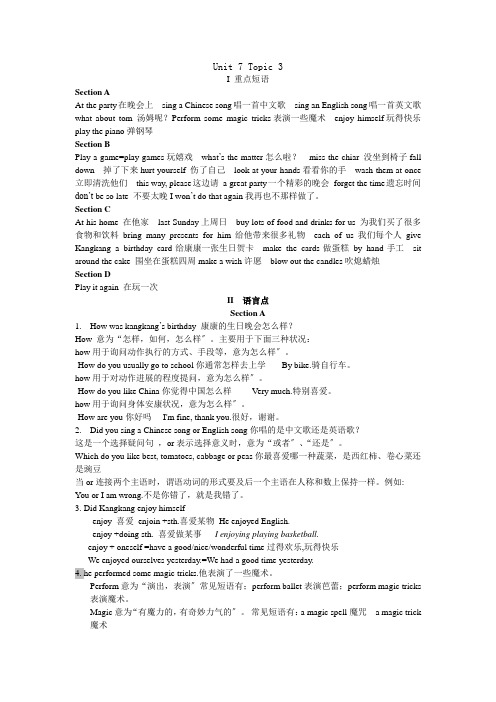
Unit 7 Topic 3I 重点短语Section AAt the party在晚会上sing a Chinese song唱一首中文歌sing an English song唱一首英文歌what about tom 汤姆呢?Perform some magic tricks表演一些魔术enjoy himself玩得快乐play the piano弹钢琴Section BPlay a game=play games玩嬉戏what’s the matter怎么啦?miss the chiar 没坐到椅子fall down 掉了下来hurt yourself 伤了自己look at your hands看看你的手wash them at once 立即清洗他们this way, please这边请a great party一个精彩的晚会forget the time遗忘时间don’t be so late 不要太晚I won’t do that again我再也不那样做了。
Section CAt his home 在他家last Sunday上周日buy lots of food and drinks for us 为我们买了很多食物和饮料bring many presents for him给他带来很多礼物each of us我们每个人give Kangkang a birthday card给康康一张生日贺卡make the cards做蛋糕by hand手工sit around the cake 围坐在蛋糕四周make a wish许愿blow out the candles吹熄蜡烛Section DPlay it again 在玩一次II 语言点Section A1.How was kangkang’s birthday 康康的生日晚会怎么样?How 意为“怎样,如何,怎么样〞。
主要用于下面三种状况:how用于询问动作执行的方式、手段等,意为怎么样〞。
仁爱英语七年级下册 Unit7 Topic3 必考知识点汇编
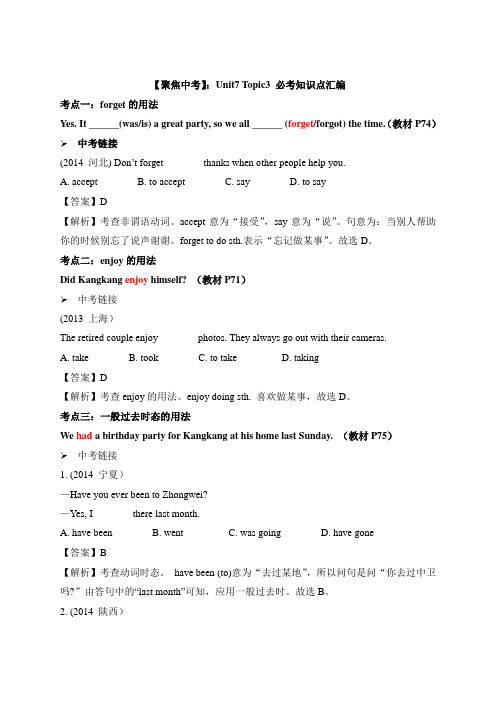
【聚焦中考】:Unit7 Topic3 必考知识点汇编考点一:forget的用法Yes. It ______(was/is) a great party, so we all ______ (forget/forgot) the time.(教材P74)➢中考链接(2014 河北) Don’t forget _______ thanks when other people help you.A. acceptB. to acceptC. sayD. to say【答案】D【解析】考查非谓语动词。
accept意为“接受”,say意为“说”。
句意为:当别人帮助你的时候别忘了说声谢谢。
forget to do sth.表示“忘记做某事”。
故选D。
考点二:enjoy的用法Did Kangkang enjoy himself? (教材P71)➢中考链接(2013 上海)The retired couple enjoy _______ photos. They always go out with their cameras.A. takeB. tookC. to takeD. taking【答案】D【解析】考查enjoy的用法。
enjoy doing sth. 喜欢做某事,故选D。
考点三:一般过去时态的用法We had a birthday party for Kangkang at his home last Sunday. (教材P75)➢中考链接1. (2014 宁夏)—Have you ever been to Zhongwei?—Yes, I _______ there last month.A. have beenB. wentC. was goingD. have gone【答案】B【解析】考查动词时态。
have been (to)意为“去过某地”,所以问句是问“你去过中卫吗?”由答句中的“last month”可知,应用一般过去时。
- 1、下载文档前请自行甄别文档内容的完整性,平台不提供额外的编辑、内容补充、找答案等附加服务。
- 2、"仅部分预览"的文档,不可在线预览部分如存在完整性等问题,可反馈申请退款(可完整预览的文档不适用该条件!)。
- 3、如文档侵犯您的权益,请联系客服反馈,我们会尽快为您处理(人工客服工作时间:9:00-18:30)。
make sΒιβλιοθήκη h. by hand 亲手做 sit around 围着坐
blow out 吹灭
二、重点句型
enjoy oneself 玩得愉快 at once 立刻,马上 each of us 我们每一个 make a wish 许愿
1.Did you sing a song at the party? Yes, I did./ No, I didn’t.
study_____________ ___________ ____________
plan_____________ ___________ ____________
fly_____________ ___________ ____________
二、句型转换
1.Ann did her homework yesterday evening. 否定句:__________________________________________ 一般疑问句:________________________________________ 肯定/否定回答:____________________________________
find _____________ ___________ ____________
begin_____________ ___________ ____________
eat _____________ ___________ ____________
play_____________ ___________ ____________
2.Did you sing a Chinese song or an English song? An English song.
3.What’s the matter?
4.What time did you come back home last night? 三、 语言点
1 Did Kangkang enjoy himself?康康玩得开心吗? Enjoy 是及物动词,后接名词,代词或是动名词,意为“喜爱,欣赏,享受„„的乐趣。” enjoy oneself = have a good/great time 玩得愉快 enjoy doing sth. 喜欢做某事 巧辩异同 like, love 与 enjoy (1)like 喜欢(程度较弱)like doing/to do (2) love 热爱(程度较强)love doing/to do (3)enjoy 喜爱,欣赏,享受„„的乐趣 enjoy doing 2.反身代词 oneself 变化如下:①第一二人称用形容词性物主代词+self(selves) I→myself you→yourself(yourselves) ②第三人称用人称代词宾格+self(selves) he→himself they→themselves 四、 重点语法---行为动词的一般过去时 1.否定句:didn’t+动词原形 如: Jim didn’t go home yesterday. 一般疑问句:在句首加 did,句中的动词过去式变回原形。 如:Did Jim go home yesterday? 特殊疑问句:疑问词+did+主语+动词原形? 如:What did Jim do yesterday? 2.动词过去式变化规则: (1)规则动词一般在动词末尾直接加 ed, 如:pull-pulled, cook-cooked, play-played (2)结尾是 e 加 d, 如:taste-tasted, move-moved (3)重读闭音节,双写末尾的辅音字母,再加 ed, 如:stop-stopped, plan-planned (4)以辅音字母+y 结尾的,变 y 为 i,再加 ed, 如:study-studied (5)不规则动词过去式:am/is-was, are-were, do-did, see-saw, say-said, give- gave, get-got, go-went, come-came, have-
课堂练习
一、写出下列动词的三单、过去式和现在分词
go _____________ ___________ ____________
enjoy _____________ ___________ ____________
buy_____________ ___________ ____________
Everyone had a good time.
一、教学内容
一、重点短语
at the party 在派对上
perform magic tricks 表演魔术
fall down 掉下,落下,摔倒,倒塌 hurt oneself 伤了某人自己
lots of= a lot of 许多
bring sth. for sb. 把……给某人
had, eat- ate, take- took, run-ran, sing-sang, put-put, make- made, read-read, write-wrote, draw- drew, drink-drank, fly- flew,
ride-rode, speak-spoke, sweep-swept, swim-swam, sit-sat
dance_____________ ___________ ____________
write _____________ ___________ ____________
run_____________ ___________ ____________
swim_____________ ___________ ____________
blow_____________ ___________ ____________
get _____________ ___________ ____________
walk_____________ ___________ ____________
take_____________ ___________ ____________
